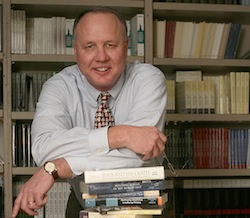I am a Noun

We are pleased to feature a new series of blog posts from Dr. Carey Newman, the director of Baylor University Press. In each post, Dr. Newman will offer helpful advice on the publication process for researchers who are starting their academic careers. Baylor University Press has experienced a remarkable transformation under Dr. Newman’s leadership; his efforts have received the attention of such outlets as Publisher’s Weekly. Dr. Newman is the recipient of a Ph.D. from Baylor University and a master’s degree in theology from the University of Aberdeen. He is the author of Paul’s Glory-Christology: Tradition and Rhetoric (Brill) and the editor of Jesus and the Restoration of Israel (IVP).
There are three—and only three—kinds of books in the world: nouns, verbs, and peanuts. Nouns are academic books; they inform. Verbs are professional books; they transform the practice of a profession. Peanuts are trade books; they entertain.
I can’t count the number of proposals I receive that say this: “my book is intended for scholars, teachers, students, clergy, professionals, and general readers” (and I add in my mind, “small children and dogs”). What I can safely say in response to projects that seek such a wide readership is this: a book intended for everyone reaches no one.
Years are spent becoming a scholar. Heavy investments by family, friends, and self. This process is not only necessary credentialing for a life in academics, it is also formative—scholarship is not what you do; you become a scholar. You don’t just write nouns; you are a noun.
There is a deep yearning inside of a scholar to reach the world with her research. In fact, there is a fair amount of chatter about the necessity of getting beyond the ivy to the city. While I am, generally, in favor of such efforts, I do have some words of caution. Scholars fantasize about obtaining such a wide readership, but have no idea the cost of climbing a second mountain.
Rule #14 in academic publishing runs like this: the same number of years, and the same amount of effort, required to become a scholar will be required to become a public writer. Becoming a writer for a large general readership is not simply a matter of adverbs and adjectives. Becoming a skilled and credentialed public writer means leaving the safe confines of the academy and learning to pay your bills by your writing.
There are ways to verb a noun and remain a scholar. Yes. There is also the process of making nuts out of nouns and still be a scholar. True. But the noun comes first. Unless you have something to say you have nothing to say. But having something to say does not mean you have learned to say it—and learning to make verbs and to shell nuts takes a lot of time and effort.
I say, be happy with being a noun. Write them. Love them. Do not feel like you have to make an apology for writing, loving and being a noun. You are a noun. Your friends are all nouns. You dream noun dreams. When you drink beer with your friends, all you talk about are nouns. Nouns are good.
Thanks for these thoughtful comments! However, I wonder if the current malaise of the shrinking church in the West may be in some way linked to this general trend of academics being ‘comfortable’ as ‘nouns’ their entire lives. What, precisely, is the virtue in a life led having a professional audience of 10-15 people? While your advice is no doubt comforting to an academic who struggles to communicate with non-specialists, aren’t you perpetuating a uniquely Western, resource-rich paradigm of specialization? I would argue that it lacks historical precedent, and isn’t something we see in the global church (my context: East Africa): a place where the church is exploding in growth. You may enjoy a recent study on how wider range (eg less ‘specialization’) is a hallmark of top performers in multiple professional fields by David Epstein called ‘Range’. Also...’peanuts’? Really?